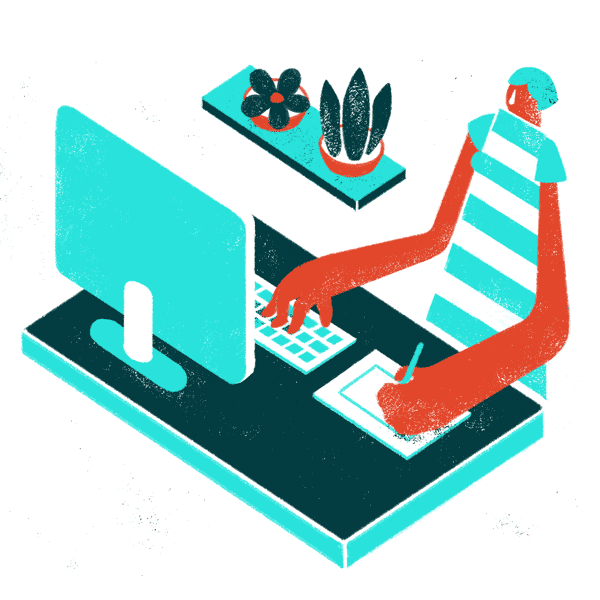To vacay or not to vacay? 🏝️
It might be tempting to work year-round, but it is not a good idea.
A lot of people have asked us how they can support The Friendly Freelancer. If you like what we’re doing, the best way to support us at the moment is to tell your friends about us. We don’t have a marketing – or other – budget, so we entirely rely on word-of-mouth recommendations to promote this newsletter. See you in two weeks!
Type “freelancers” and “holiday” into Google and you’ll get two types of results. The first being “are freelancers always on vacation?” (wait, what?!), while the second can be grouped under the banner “how do I take a *real* holiday as a freelancer?” (now we’re talking).
What I actually wanted to know when I entered these keywords, was how many freelancers continue working while they’re on holiday. Because, yes, I’ve travelled more than I ever did since I became a freelancer, but the last time I took a *true* holiday – the kind those Google search requests were asking about, the kind where you set a cutesy out-of-office message – must have been when I was still working a salaried job. How do other freelancers do this?

The little research that has been done into this offers a rough picture. A Dutch study from 2015 indicates that 94% of self-employed persons remain available to current and prospective clients. Half of them continue working while on holiday. According to a 2019 study done in the U.S., this is true for 92% of American freelancers. Many freelancers don’t feel great about this: 43% of them try to hide they’re taking time off from their clients, while 41% try to hide they’re doing work while on holiday from their partners or friends.
It’s the well-known freelancer’s holiday dilemma: taking time off means less revenue; not relaxing means less mental resilience. Your choice. For me, this has meant half-baked holidays during which I work in the mornings or report stories while on a trip. This means I never fully deconnect from my work but hey, it’s something, right? With this year’s limited holiday options and an uncertain future ahead, it might be tempting not to take time off at all.
But a recent article in Pyschologie Magazine made me rethink this freelancer’s holiday dilemma. Might there be shades of grey to the black-and-white statement that working equals money and time off doesn’t? The article I read said it was more nuanced than that and that relaxation comes in different shapes and sizes, from five-minute breaks to long sabbaticals; that it refocuses our attention, restores our motivation, boosts our performance and improves creativity. Being glued to a screen for hours on end, on the other hand, is detrimental to our productivity and creativity. So it’s better, the article argues, to see relaxation and work as yin and yang elements that help us obtain better results. In other words, taking a break will pay off in the long term – literally and figuratively.
So, relaxation and rest, but how? There’s a fat chance that your holiday – just like mine – got cancelled this year. How can you relax from home when you’ve been working from that same home for months? An advisory committee to the Belgian government recently made a number of science-based recommendations for everyone struggling with this question at the moment. They go from seeking out unfamiliar experiences and taking time for your hobbies, interacting with friends, to trekking into nature and exercising. And simply not doing anything at all, that too.

I recently spoke to professor Elke Van Hoof, chair of the working group focused on Covid-19’s psychosocial impact at the Belgian Superior Health Council, for the online lecture series Moeilijke Dingen Makkelijk Uitgelegd. She offered a really practical tip for those looking to relax during these stress-filled times. Van Hoof advised creating a bucket list of things small and big you would like to do that you normally don’t have time for. Figure out what’s doable this summer and start checking items off.
Planning moments of relaxation and creating a holiday feeling will require extra creativity this year. But that’s precisely what we’re good at as creative freelancers. We’re used to fashioning something beautiful from limited budgets and possibilities. I’ve already starting drawing up my own list. How will you take time off this year? Do you have any advice? Let us know at freelancerthefriendly@gmail.com
Selma
What I’m watching, reading, listening to this week:
Off Assignment is a literary magazine with a penchant for journeys and a fascination with strangers. I love reading the ‘Letters to a stranger’ section.
You may have seen advertisements for Masterclass video classes popping up everywhere, enticing you to improve your creative skills this summer. Is it worth it? The Guardian took the test.
Twitter thread about the freelance holiday dilemma, with freelancers offering tips to schedule breaks. The most creative one? Unplug your modem and send it to yourself by mail and enjoy a few internet-free days.
What our readers are saying:
“I’m a Venezuelan freelance journalist living in Argentina and I cannot tell you how much calmness your posts give me. With everyone struggling and facing their own troubles, reading other colleagues’ experiences can be a true sign of comfort. If it’s of any help, usually what I do to keep myself working and being disciplined, is putting my phone on airplane mode during those 25 minutes of work. Why? Because WhatsApp can turn into my worst enemy ... Besides, if you have crappy Wi-Fi it can also help you to improve your connection speed while you work on your notebook or any other device. Please, keep on doing the good job.”
Reader M. Daniela Araujo’s response to “Discipline is a superpower”
This newsletter was written by Selma Franssen. Selma is a Dutch freelance journalist living in Brussels. She is the author of Vriendschap in tijden van eenzaamheid and has written for Charlie Magazine, OneWorld, De Morgen, De Standaard, The New Statesman, Bustle, Knack, VPRO and Newsweek.
You’ll hear from Linda A. Thompson in two weeks, a Belgian freelance journalist who writers about all things law and social justice. She’s written for Bloomberg Law, Deutsche Welle, OZY, International Politics & Society, USA Today, IJNet, Underpinned and Equal Times.




